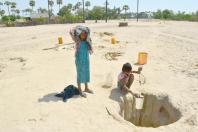Dawn / ANN
THE geopolitical calculus in Pakistan’s immediate neighbourhood is clearly changing, and those who formulate this country’s foreign policy must plan now to ensure we are comfortably placed to take political and economic advantage of the emerging scenario.
Over the past few days, reports have emerged of a 25-year strategic bilateral deal involving China and Iran being hammered out between the two sides; the deal is said to cover both economic and military aspects.
Moreover, relations between the US and China seem to be going into a deep freeze, with some talking of a new ‘cold war’ between Washington and Beijing. The US has ordered the Chinese consulate in Houston to close in order to “protect American intellectual property”, with China slamming the move as “outrageous”. Moreover, on a recent trip to the UK, US Secretary of State Mike Pompeo called for building a “global coalition” against the People’s Republic.
Considering Pakistan shares borders with both Iran and China, and has had a long, chequered relationship with the US, Islamabad will need to play its cards right to protect national interests on the highly treacherous international chessboard.
The Iran-China deal — said to be worth hundreds of billions of dollars — offers an opportunity to Pakistan. While Pakistan enjoys cordial relations with China, this can be a good occasion to improve relations with Iran. China seeks to build a 21st-century Silk Road in the form of the Belt and Road Initiative, envisioning a global network of trade routes emanating from Beijing. It is in this context that it seeks to cement a deal with Iran, while CPEC is also a product of the same strategic thinking.
On the other hand, Tehran — struggling to stay afloat under crushing US-led sanctions — will gladly accept foreign investment, as well as a chance to sell its oil and gas. Pakistan can play a positive role in this budding relationship, with a chance at becoming a key conduit in an energy and trade corridor linking the Eurasian hinterland to South Asian and Gulf ports.
But there is a catch. As stated above, the US is in a combative mood vis-à-vis China, while Iran has been Washington’s bête noire for over four decades. America has already spoken in unflattering terms about CPEC, while it is widely believed India has backed out of Iranian projects in order to avoid enraging Washington.
To take advantage of regional developments, Pakistan will need some deft diplomacy. Regional integration can help this country and its neighbours economically and politically if proper planning is done. The US must be told that while Pakistan values its relationship with America, Islamabad cannot isolate itself regionally by alienating neighbours with whom Washington does not get on.
India should also weigh its options; does it want to chase the fantasy of becoming a US ‘strategic partner’? Or would it rather live in peace and prosperity with its neighbours?
Published in Dawn, July 23rd, 2020










